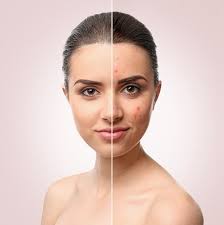You should consider seeing a dermatologist for acne treatment in the following situations:
- Over-the-Counter (OTC) Treatments Aren’t Effective: If you’ve tried OTC acne products for several weeks or months, and your acne hasn’t improved or has worsened, it’s a sign to consult a dermatologist. They can assess your condition and recommend prescription treatments or other approaches.
- Moderate to Severe Acne: If you have moderate to severe acne characterised by numerous pa pules, pustules, nodules, or cysts, a dermatologist’s expertise is crucial. They can prescribe stronger medications and provide more effective treatment options to prevent scarring.
- Persistent Acne: If your acne keeps recurring or doesn’t seem to go away despite treatments, professional guidance can help determine the underlying causes and develop a long-term management plan.
- Acne Scarring: If you have developed acne scars, a dermatologist can suggest various methods to minimize their appearance, such as laser therapy, chemical peels, microneedling, or dermal fillers.
- Hormonal Acne: For individuals with hormonal acne, particularly women, a dermatologist can prescribe oral contraceptives or other hormonal treatments to regulate hormone levels and manage acne.
- Emotional Distress: If acne is causing emotional distress or affecting your self-esteem and quality of life, it’s essential to seek professional guidance. A dermatologist can provide solutions and support.
- Specific Acne Types: Some types of acne, like cystic acne or acne conglobata, are more severe and may require specialized treatment. A dermatologist can tailor a treatment plan for your specific type of acne.
- Comedonal Acne: For stubborn comedonal acne (blackheads and whiteheads), a dermatologist can provide effective treatments to clear pores and prevent new comedones from forming.
- Preventive Strategies: Even if your acne is mild, a dermatologist can offer valuable advice on preventive measures, personalized skincare routines, and lifestyle changes to minimize future breakouts.
- Complex Skin Issues: If you have other skin issues or conditions that need to be addressed alongside acne, like eczema, psoriasis, or rosacea, a dermatologist can provide comprehensive care and ensure treatments don’t worsen other skin conditions.
It’s important to remember that dermatologists are experts in diagnosing and treating various skin conditions, including acne. They can offer a personalised treatment plan tailored to your unique skin type, the severity of your acne, and any other relevant factors. Consulting a dermatologist can lead to more effective and faster results in managing and treating acne.
For more information about Acne Treatment , Consult Dr. Sayali Thakare, Best Dermatologist in Bandra at Saavya dermatology and laser clinic.
